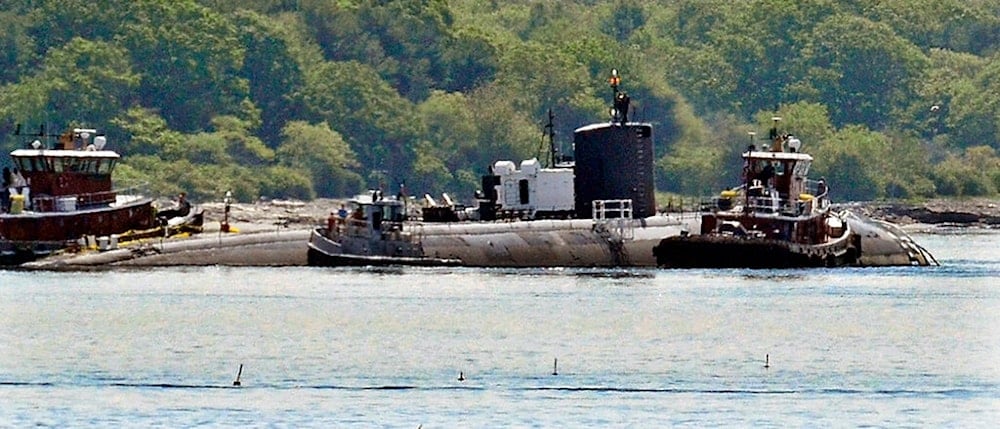US nuclear submarine fleet declines as production slows, expert warns
This decline comes at a critical moment as the US increasingly seeks to project its military power globally.
-

In this Friday, June 12, 2015, photo provided by the US Navy, tugs assist as the former USS Miami nuclear-powered submarine is towed from the Portsmouth Naval Shipyard in Kittery, Maine. (AP)
An opinion piece published on American Affairs by writer and retired US Navy Captain Jerry Hendrix has raised concerns about the declining strength of the US nuclear submarine fleet.
Hendrix discusses how the once formidable force, which boasted around 140 nuclear-powered submarines during the Cold War, has dwindled to just 67 today, with only 49 classified as fast attack submarines.
This decline comes at a critical moment as the US increasingly seeks to project its military power globally.
Hendrix also points to a slowdown in submarine production, noting that only one new fast-attack submarine is slated for procurement in the military’s budget for fiscal year 2025.
This falls short of the Navy's thirty-year shipbuilding plan, which calls for three fast attack submarines and one ballistic missile submarine to be produced annually.
Read more: US Navy sent guided-missile submarine to Middle East
Adding to these challenges, the US faces a shortage of shipyards certified to maintain its submarines.
The ten dry docks spread across four naval shipyards and three commercial facilities are operating at full capacity, but delays remain a significant issue.
Hendrix estimates that at least three additional dry docks and an expanded workforce are necessary to alleviate these maintenance bottlenecks.
US military lagging behind
Earlier this month, Hal Brands, a Bloomberg columnist, said that Vice President Kamala Harris' recent call for maintaining the world's most “lethal” military is a sentiment underscored by current global tensions.
He warns that Russia is continuing to gain ground in Ukraine, while China is rapidly expanding its military and stockpiling resources. The DPRK is likewise advancing its nuclear and missile capabilities, and Iran is only increasing its influence and deterrence in the Middle East.
Despite what Brands called "threats", he notes that the US faces significant challenges in modernizing its military.
The Pentagon’s effort to update its nuclear arsenal is plagued by delays and budget overruns. The modernization of bombers, land-based missiles, and submarines is lagging, and critical infrastructure is falling behind.
The US risks weakening its deterrent capability "at a time when it may need more nuclear weapons to maintain deterrence in a world in which both Russia’s and China’s forces rival its own."
Similarly, the US Navy is experiencing strain as it is decommissioning 17 logistical-support ships and is already stretched thin globally. The Navy requires more nuclear-powered attack submarines to counter China’s expansion but struggles with maintenance issues and a deteriorating shipbuilding industry.
Read more: US Fleet readiness assessment concludes US Army not ready
According to Brands, the US faces worsening defense challenges as many of its Ronald Reagan-era ships, submarines, and planes approach or exceed their retirement age, with replacements not expected until the 2030s.
The military’s new strategies for high-intensity conflicts, like the Air Force's Agile Combat Employment and the Army’s Multi-Domain Operations, are still in development, leading to a firepower gap in the late 2020s when China aims to be prepared for potential action against Taiwan.
Despite the US military budget approaching $1 trillion, the actual defense spending is relatively low, at about 3% of GDP, a level not seen since World War II. Additionally, a significant portion of the budget goes to personnel costs, which may increase due to recruitment challenges. The acquisition of new capabilities is hampered by an inefficient process, and the US' global commitments spread its forces thin, unlike Russia and China, which can focus on specific regions.
The author argues that the US faces critical dilemmas in its defense strategy, struggling to balance nuclear and conventional modernization amid financial constraints. The Pentagon must make tough decisions between investing in future capabilities and maintaining current ones, risking escalation in nuclear conflicts if conventional forces are weakened. According to the National Defense Strategy Commission, the US might be unprepared for a major war, potentially facing shortages in munitions and an inability to quickly replace lost assets.
Senator Roger Wicker suggests increasing defense spending to 5% of GDP to restore strategic safety, though this would be politically challenging, requiring significant tax hikes or entitlement cuts.
Historically, the US has often increased defense spending only after facing major strategic shocks, such as those experienced during Korea, Afghanistan, Pearl Harbor, and 9/11. Brands concludes by noting that a serious discussion is needed on the costs and implications of national security to avoid future military inadequacies.

 5 Min Read
5 Min Read








